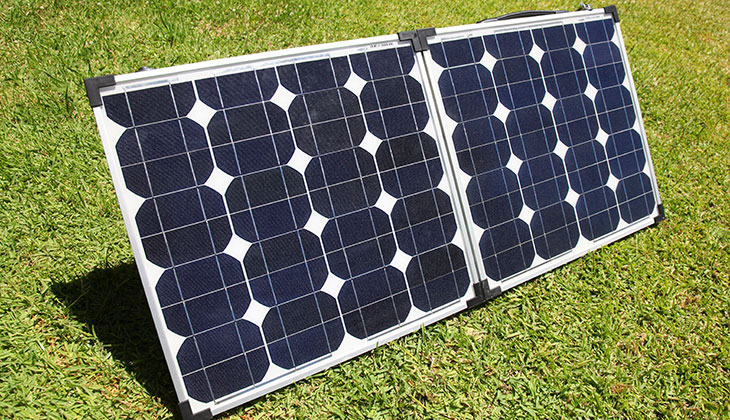Solar power for caravans
Chris Hogan, 28th March 2013, Caravan
We're seeing more and more solar panels on rooftops these days and it's no surprise seeing them hooked up on caravans. But can solar power really deliver, and is it workable for touring and static caravans?

We ran an article about alternative methods of charging batteries for our boat insurance customers back in February. In this article we're going to focus on solar panels (the electric type, not the hot water ones) but you might find some of the alternatives in the Boat article of interest.
Debunking the 'solar' myth
Many of you will be thinking "right, using solar panels might be great on a touring holiday abroad but it won't be any good in the UK."
But the first thing to say is that you don't need hot sunny days to get power from the sun. The name 'solar' power is accurate but misleading as the power does come from the sun but it's light that does the job, direct sunlight isn't needed.
Of course you'll get more power, and batteries will charge faster, on a hot sunny day and there are more daylight hours in the summer anyway. But you will still get power, even on overcast days, and solar power can work well as a backup even in winter.
Trickle charging
Probably the first practical application for caravans, these are the cheapest and easiest way to trap solar power and they do a great job. Originally intended for cars, they are thin solar panels about the size of a number plate, connected by a cable to a cigarette lighter plug. The panel is then put in a window and that's it.
With a caravan you might need to connect direct to your battery using crocodile clips so choose a unit which has those as well. A longer cable – some are up to ten feet in length – also gives you the ability to reach a window from almost anywhere in the 'van.
Bigger, more powerful panels
Larger solar panels are no different, really, they just provide more power. If you're in a static caravan there's probably nothing to stop you covering the whole roof with panels so that you only use the hook-up when you really need it, as backup. If you're on a site then the owners might not like it, particularly if you're paying them for the electricity, so tread carefully.
For touring caravans or occasional use with a static, there are folding panels that you can get out and put away as required. We are used to seeing them on roofs but these can simply be put on the ground outside the caravan. You might want to put them away inside the caravan if you're going out though, which can be frustrating if you're missing the daylight, so some sort of secure fixing might be worthwhile.
Google "solar power calculator" and you'll find a number of webpages where you can find out how big a panel (or panels) you need. All you have to do is enter the wattage of the devices you're going to use (you'll find this on each product's label) and the length of time you'll use each one. This will also tell you if it would be worth adding another battery to take more advantage of solar power.
Going the whole hog
It is possible to create a system for powering the whole of a caravan's electricity supply using solar panels, perhaps as backup for when you aren't able to hook- up, or for a static caravan where's there's no supply.
The exact details are too long to go into in this article but basically you would hook-up more, larger solar panels to your batteries using a charge regulator to make sure they aren't overcharged and to prevent them discharging overnight. Inverters can convert the 12V DC output of the solar panels to 240V AC for mains appliances.
Thinking outside the box
Taking that idea a little further, it is theoretically possible to do away with the need for 240V mains. If you think about it, many of the appliances we use a lot today need transformers to take the household 240V AC supply DOWN to a low voltage DC current. Why bother doing that if you solar panels are proving 12V DC in the first place?
Mobile phones, MP3 players, laptops, computers, tablets and low voltage halogen or LED lighting systems all run on DC current of 5, 9 or 12V. As long as you know enough to put the correct regulators in place to deliver the right voltage and current, they could be charged or run from solar panels, or batteries charged by solar panels.
The only problem is when you need heat or to run a motor. So cooking, boiling water and powering devices like washing machines, tumble dryers, hairdryers and irons wouldn't be practical. But look out for travel versions designed to run from car cigarette lighters – that means they are using 12V DC.
Do what suits you
There's a wealth of different products on the market so do your research and find out what suits you. You might just end up getting a solar-powered charger for rechargeable batteries or a specific one for a mobile phone or MP3 player, taking that load off your caravan mains supply to save money.
On the other hand you might get the bug and end up getting all your power for free.